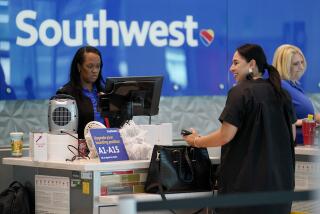How to Keep on Top of Your Travel Costs
- Share via
With 104 stores in 17 states and 25 more Fast Frame franchises on the way, founder and President John Scott is on the road and in the air much of the time.
This year, Scott says, Fast Frame’s travel expenses will reach about $240,000, a lot of money for a fairly small--$16 million in sales--company to spend on travel.
But Scott says supporting new franchisees with personal visits is critical to his success, so the company views travel expenses as an investment in its future.
For most business owners, spending travel money is easy. Keeping track of it is another story.
“Checking employee expense reports is probably my least favorite job; it’s a real pain in the backside,” said Scott, who started the Agoura-based company about seven years ago in England before exporting his concept of quick, professional picture framing to the United States.
Like most small-business owners who travel, Scott said he is always seeking ways to simplify the arduous task of booking business trips and tracking the money spent away from the office. Keeping careful track of travel expenses is particularly important because it is becoming more costly to take your company’s show on the road.
“Travel costs are rising dramatically,” said Michael Woodward, vice president of consulting services for American Express Travel Related Services in New York City. “The average cost of air fare for the business traveler has gone up between 8% and 11% over the last year.”
Woodward said hotel costs are up 6%. Car rental costs for individuals and employees of small businesses, who do not have the clout to negotiate the lowest rates, have jumped 7%, according to a recent study by American Express.
But even though business travel is expensive, Woodward said, small-business owners are still packing their bags.
“Most companies see business travel as a necessary evil,” Woodward said. “But smaller companies see it as an investment and as a way to grow their business.”
To streamline expense reporting, Fast Frame’s Scott ordered company credit cards from his bank for the half-dozen employees who travel. He also designed a special expense reporting form with an envelope attached to collect the receipts that often disappear. He asked his secretary to serve as travel manager--to keep track of who is going where and when.
Reducing costs and streamlining your travel reporting requirements are not as daunting as you might think. One of the easiest ways to save money and time is to work with a travel agency that specializes in serving small businesses. Some people still don’t realize that it costs nothing to utilize the services of a travel agency. The agency earns its money on commissions paid by the airlines, hotels, car rental companies and cruise lines, not by charging fees to its customers.
Even the smallest business can rely on a good travel agent to find the lowest air fares and negotiate the best rates for hotel rooms and rental cars.
“Most people making their own airline reservations don’t have the ability to pull up 14 different carriers on a computer screen,” said Caryl Steinberg-Bendinger, a 20-year veteran of the travel industry and owner of Master Travel & Tours in Chicago.
“We fare-shop and always look for the lowest applicable rates,” said Steinberg-Bendinger, who estimates that 60% of her business is devoted to serving small businesses.
She said most small-business owners rely on her staff to get them the best value for their travel dollar. But she said it is becoming harder and harder to find low fares because business travelers are bearing the financial burden of air fare deregulation.
“The businessman is paying for deregulation with exorbitant fares,” she said. For example, a leisure-time traveler willing to buy a discount ticket with certain restrictions a few weeks in advance can fly round trip across the country for less than $150. In contrast, one of Steinberg-Bendinger’s clients recently had to pay $580 for a round-trip ticket between Chicago and Philadelphia.
While air fares and hotel rates are going up, the tax man is cracking down on travel expense reporting. Many small-business owners may be unaware of changes brought about by a little-noticed amendment to the Family Support Act of 1988 that took effect July 1.
The rules established new requirements for cash advances, per diems, car mileage programs and expense reimbursements. Now the Internal Revenue Service requires companies to have what the government considers an “accountable plan” for tracking travel expenses.
According to a brochure published by American Express, an accountable plan has four basic elements. First, any reimbursement or cash advance you provide to employees must be used only in connection with their duties.
Next, all expenses must be documented according to existing IRS rules. Advances must be drawn within a reasonable period before expenses are incurred, usually 30 days. Finally, any unspent funds must be returned to the firm within 120 days.
If the money is not returned on time, it can be considered income and must be taxed.
Companies that allow their employees to exceed the per-diem amounts set for federal employees may also be subject to extra taxes.
This year, the IRS has set a uniform “high” rate of $122 per day. The actual federal per diem varies from a high of $141 for New York City to a low of $85 for most places in the continental United States.
And for people who drive their own cars on company business, the federally set mileage rate has been raised to 26 cents per mile from the 25.5 cents allowed last year.
TRAVEL TIPS * Find a good travel agent who specializes in planning business trips.
* Designate one person to be responsible for keeping track of travel expense reports, even if everyone in your company makes his or her own travel arrangements.
* Review all employee travel expense reports at least once a month.
Try to avoid last-minute trips, which cost more.
* Always ask for the best rates on hotel rooms and rental cars. The “corporate rate” is not always the cheapest.
* Follow the new IRS regulations on travel expenses to avoid problems.
More to Read
Sign up for The Wild
We’ll help you find the best places to hike, bike and run, as well as the perfect silent spots for meditation and yoga.
You may occasionally receive promotional content from the Los Angeles Times.






